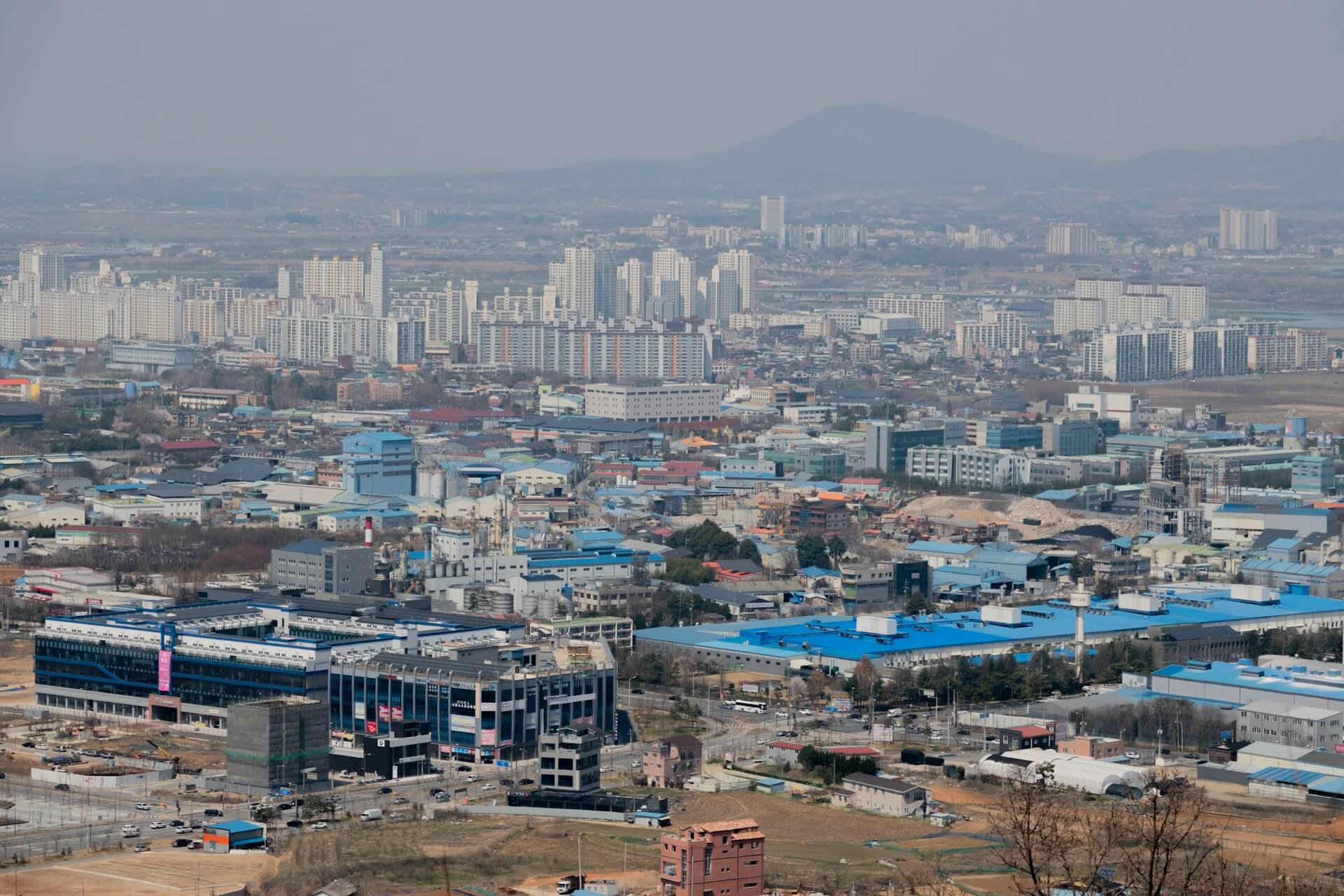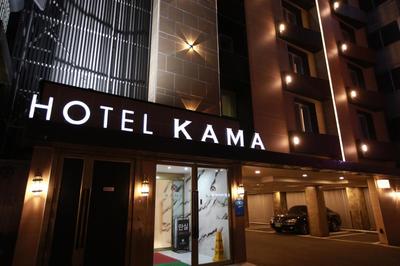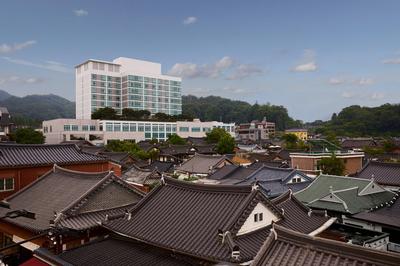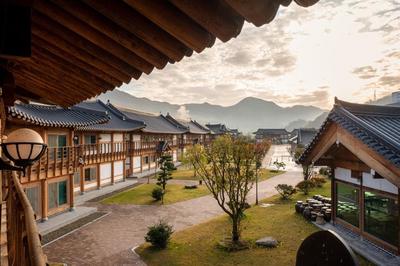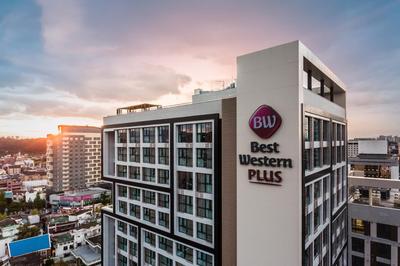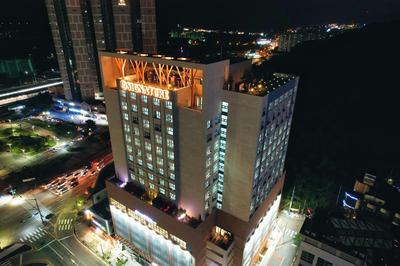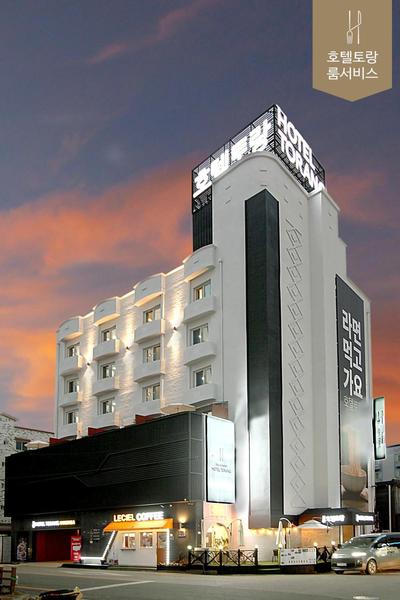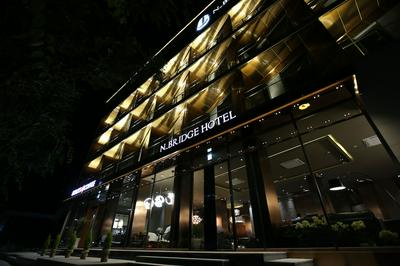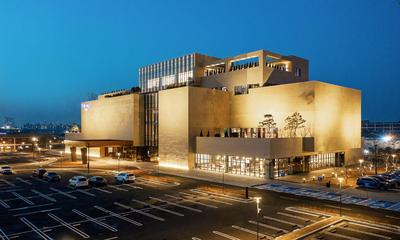When to visit Jeonju?
Jeonju, a city known for its rich cultural heritage and delicious cuisine, experiences a temperate climate with four distinct seasons. Spring (April to June) is a delightful time to visit, as cherry blossoms bloom, creating picturesque scenery throughout the city. With temperatures ranging from 10°C to 20°C, outdoor exploration becomes a joy with pleasant weather.
Summer (July to August) can get quite hot, with temperatures often exceeding 30°C. This is the peak tourist season when visitors flock to Jeonju for its vibrant festivals and outdoor activities. However, if you don’t mind the heat, it’s an excellent time to enjoy the city’s famous food scene and lively markets.
Autumn (September to November) is another prime time to visit, with stunning foliage transforming the landscape into a palette of fiery reds and oranges. Temperatures moderate, making it perfect for sightseeing and participating in cultural events. The Jeonju International Film Festival, held in May, also attracts many cinephiles to the city.
Winter (December to February) brings colder temperatures, often falling below freezing. While this season sees fewer tourists, Jeonju's unique charm lies in its celebration of traditional Korean New Year during this time. If you enjoy winter scenery and trying seasonal dishes, visiting in January or February can be rewarding, albeit chilly.
How to get to Jeonju?
Reaching Jeonju is relatively straightforward, thanks to its well-connected transportation network. The closest airport is Gunsan Airport, located about 45 kilometers away. Flights from major cities like Seoul and Busan frequently connect here, making it easy for travelers.
If you’re arriving by train, the KTX high-speed train operates frequent services from Seoul, taking about 90 minutes to reach Jeonju Station. Alternatively, express buses run regularly from various cities, including Seoul and Incheon, with travel times averaging around 3 to 4 hours, depending on traffic.
For those who prefer driving, Jeonju is accessible via several major highways. It takes approximately 3 to 4 hours by car from Seoul depending on traffic conditions. Parking facilities are plentiful across the city, making it convenient for road trippers.
Tourist activities in Jeonju
Jeonju is brimming with activities to engage visitors of all interests. Begin your experience at the Jeonju Hanok Village, where traditional Korean houses offer a glimpse into the past. Stroll the charming streets, indulge in local street food, and don't miss tasting Jeonju bibimbap, the city’s famous signature dish.
When it comes to cultural attractions, the Jeondong Cathedral, a striking example of Gothic architecture, is a must-see. Art enthusiasts will enjoy the various art galleries and exhibitions showcased at the Jeonju Art Museum.
The city also caters to outdoors lovers. Explore the peaceful surroundings of Deokjin Park, famous for its lotus flowers, or take a bike ride along the picturesque riverside paths.
For nightlife, head to the area around Hanok Village where cozy cafes transform into vibrant bars as the sun sets, offering an exciting experience after a day of exploring.
Events and festivals
Jeonju is known for its lively annual events that reflect its rich cultural heritage. The Jeonju International Film Festival, held every April, showcases a diverse blend of films, attracting filmmakers and movie buffs from around the globe. This festival not only highlights cinematic talent but also turns the city into a vibrant cultural hub.
In late autumn, the Jeonju Bibimbap Festival takes place, typically in October. Celebrating the city's signature dish, this event features cooking demonstrations, tastings, and lively performances. Visitors can learn about the history and ingredients of bibimbap while enjoying various culinary activities.
The Hanok Village hosts seasonal events, including traditional dance and music performances, especially during the summer months. Additionally, the Korean New Year is celebrated vigorously in January, offering visitors a unique insight into Korean traditions and customs.
Family and kids activities
Families visiting Jeonju will find plenty of engaging activities for kids of all ages. The Jeonju Hanok Village is a great starting point, where children can explore traditional Korean houses and enjoy cultural experiences like wearing hanboks (traditional clothing) and participating in crafts.
For outdoor fun, Deokjin Park offers playgrounds and beautiful walking trails. The park features a large pond with pedal boats available for rent, ensuring an adventurous day out for the kids.
The National Intangible Heritage Center showcases various traditional Korean crafts and performances, often holding workshops suitable for children. Meanwhile, Jeonju Zoo provides opportunities for kids to enjoy animals in a spacious environment, integrating education with leisure.
Several museums, like the Jeonju Traditional Wine Museum, welcome families, and explain traditional winemaking in an engaging way. Overall, Jeonju offers a mix of culture and fun that keeps families entertained.
What to see in Jeonju?
Jeonju is home to numerous attractions that showcase its cultural richness and history. Here are some key spots to consider:
- Jeonju Hanok Village: Over 800 traditional Korean hanoks, offering a unique glimpse into Joseon-era architecture.
- Jeondong Cathedral: A stunning Gothic-style church, it’s a beautiful landmark and perfect for photography.
- Gyeonggijeon Shrine: A historical site that houses the portrait of King Tae-jo, the founder of the Joseon Dynasty.
- Jeonju Traditional Wine Museum: Explore the art of traditional Korean wine and taste some variants.
- Deokjin Park: Known for its beautiful lotus flowers and tranquil environment, ideal for a family picnic.
- Omgidong Mural Village: A vibrant area filled with colorful murals, perfect for art lovers and Instagram photos.
Accommodation in Jeonju
Jeonju offers a variety of accommodation options, catering to different budgets and preferences. If you’re looking for a unique experience, consider staying in one of the traditional guesthouses (hanoks) within Jeonju Hanok Village. These provide a comfortable, authentic experience surrounded by history.
For more modern amenities, there are several hotels and inns that offer a mix of comfort and convenience, typically within walking distance to major attractions. The Jeonju Wolgan Hotel and 24 Hotel are popular choices for travelers seeking comfort with easy access to the city.
Backpackers and budget travelers will find plenty of hostels and guesthouses that provide affordable accommodations in the city center. Prices typically range from $30 to $150 per night depending on the type and location. Book in advance during peak tourist season to ensure the best selection.
Important numbers and information
- Emergency Number: 119 (Fire/Medical), 112 (Police)
- Tourist Information Center: Jeonju Tourist Information Center, - Ph: +82-63-288-0013
- Main Hospitals: Jeonbuk National University Medical Center, Ph: +82-63-250-1000
- Airport Contact: Gunsan Airport, Ph: +82-63-467-1111
- Public Transport Info: Call +82-63-230-5151 for bus schedules
- Taxi Apps: Kakao Taxi, Uber
- Currency: South Korean Won (KRW); Credit cards widely accepted
- Payment Methods: Cash and credit cards
Where to eat?
Jeonju is often hailed as a culinary capital of South Korea, particularly for its bibimbap. Dining in the city offers a delectable journey through traditional Korean flavors. The Hanok Village is a fantastic area to explore local restaurants where you can savor dishes made from fresh, local ingredients.
Street food is also vibrant in Jeonju. Try the popular bindaetteok (mung bean pancakes) and hotteok (sweet pancakes) from street vendors. Prices for meals range from $5 to $20, depending on the venue.
If you’re keen on trying dishes beyond bibimbap, explore the numerous restaurants specializing in Korean fried chicken, BBQ, and jjim (braised dishes). Many establishments offer a cozy ambience, making dining out an enjoyable experience in the heart of this charming city.
Nightlife – where to go out?
Jeonju’s nightlife is a unique blend of tradition and modernity, characterized by charming bars and lively cultural spots. The area surrounding Jeonju Hanok Village is particularly popular for its vibrant nightlife. Notable bars include:
- Beer in the Kitchen: A small brewery offering a variety of craft beers with a cozy atmosphere.
- Jeonju Bar: Known for its innovative cocktails and laid-back vibe, it’s a favorite among locals and tourists.
As for clubs, Club TS: is a popular spot for dancing, featuring DJ nights and a lively weekend crowd. Voici: is another well-known venue where you can enjoy live music and performances. Outdoor spaces and beer gardens near the Hanok Village often come alive with music and laughter as evenings roll in, making Jeonju's nightlife an inviting experience.
Transport and taxis
Getting around Jeonju is made easy with its efficient public transport system, including buses and taxis. The city’s buses connect most tourist hotspots and are reliable, making them a great option for visitors. Ticket prices are quite affordable, averaging around 1,200 KRW per ride.
The Jeonju subway doesn’t exist; however, taxis are readily available and provide a convenient way to navigate the city. Taxi fares start at 3,000 KRW, and rides are generally reasonable. Popular taxi apps such as Kakao Taxi can be downloaded for easier access.
For those opting for a more local experience, bicycles can be rented at various stations throughout the city, encouraging exploration at a leisurely pace. Safety tips include being mindful of traffic and navigating through busy intersections with caution.
- Check bus schedules online for real-time updates.
- Always carry cash for smaller expenses, as not all taxis accept cards.
- Use pedestrian paths in busy areas and respect traffic rules.
Parking and public garages
Parking in Jeonju is quite manageable, especially in the city center. There are numerous public garages and outdoor parking lots available. Most parking garages charge around 1,000 KRW per hour, with daily maximum rates typically capping at 10,000 KRW.
Street parking is also an option, but be mindful of signs indicating allowed parking areas to avoid fines. Areas near popular attractions may experience higher traffic, so arriving early is recommended if you’re visiting during peak times. For tourists driving rental cars, familiarize yourself with local driving rules, and keep an eye out for designated parking zones to ensure a smooth experience.
Surroundings of Jeonju
Exploring the surroundings of Jeonju opens up a world of picturesque landscapes and cultural sites. Just a short drive away, the beautiful Naejangsan National Park beckons, especially in autumn when its foliage is breathtaking. The park offers hiking trails, scenic views, and the chance to enjoy nature.
Additionally, the historic town of Gongju, known for its ancient tombs and cultural relics, provides a glimpse into Korea's rich history, merely a one-hour drive from Jeonju. Other charming nearby villages include Wanju and Imsil, where you can experience rural life and stunning countryside landscapes.
For a day filled with aquatic fun, consider visiting the Wo mola Beach, located about 40 minutes from the city, where you can relax by the water or engage in outdoor activities. Each of these destinations offers a unique experience, making them perfect for day trips from Jeonju.
